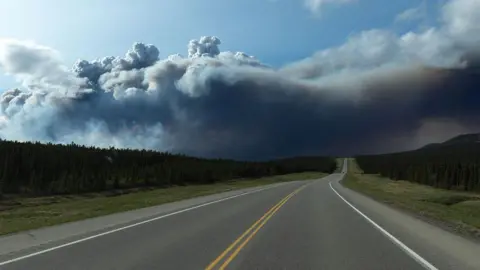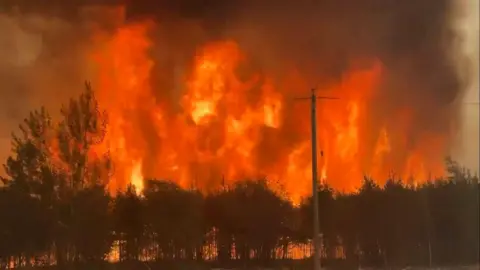Thousands evacuate from fast-moving fires in Canada
 Getty Images
Getty ImagesSome 17,000 people have evacuated the Canadian province of Manitoba as fast-moving wildfires move across parts of the country.
A military aircraft and helicopters have been used to evacuate some residents in remote areas as firefighters face growing flames. Hot and dry weather is expected in the coming days.
Dense smoke from the fires - of which there are more than 188 according to officials - has spread across Canada and into parts of the US.
Both Saskatchewan and Manitoba have declared states of emergency for the next month and have asked for international help in fighting the fires.
In Saskatchewan, there are 17 wildfires burning as of Saturday, with eight classified as not contained. The Canadian Interagency Forest Fire Centre (CIFFC) classified conditions in the province as extreme.
Saskatchewan Premier Scott Moe warned at a Saturday news conference that the current figure of 8,000 fire evacuees could climb to 10,000 as dry weather conditions persist.
"The next four to seven days are absolutely critical until we can find our way to changing weather patterns, and ultimately a soaking rain throughout the north," Mr Moe said.
Large parts of Alberta and British Columbia have also ordered evacuations as the fires spread.
The evacuation of residents of the northern First Nations community of Pukatawagan, is a "rapidly evolving situation", a Manitoba official told the BBC on Saturday.
Canadian Armed Forces, Manitoba Wildfire Service and Manitoba's Heavy Urban Search and Rescue Team have been using a military aircraft and helicopters to bring people to safety from the northern community in Manitoba.
"The scale and complexity of these air evacuations cannot be overstated — and neither can the unwavering dedication of the teams executing them," Prime Minister Mark Carney said on Saturday.
In Flin Flon, a city of 5,000 in Manitoba, only firefighters and support workers are left in the town.
In Manitoba, there are a total of 25 active fires, according to the province's fire situation report, with 11 classified as out of control.
Danielle Desjardins, a meteorologist with Environment and Climate Change Canada based in Winnipeg, told the BBC that the forecast for both provinces is not promising.
While a cold front is expected to hit some parts of Saskatchewan, it will not bring relief to the regions where fires are burning.
"The bad news about this cold front is it's going to be windy," said Ms Desjardins, adding that the wind, coupled with the heat and lack of rain, are prime conditions for wildfire spread.
Smoke from the fires has also left an estimated 22 million Americans under air quality alerts this weekend.
In northern Minnesota, residents have been warned smoke could reach levels "unhealthy for everyone", while the rest of the state faces air quality warnings for sensitive groups. That alert runs through Monday evening.
Canada experienced its worst wildfire season on record in 2023, when more than 42 million acres (17.3m hectares) burned.
Fires happen naturally in many parts of the world, including in Canada.
But climate change is making the weather conditions needed for wildfires to spread more likely, according to the UN's climate body.
Extreme and long-lasting heat draws more and more moisture out of the ground and vegetation.
 Manitoba Government via EPA-EFE/Shutterstock
Manitoba Government via EPA-EFE/Shutterstock